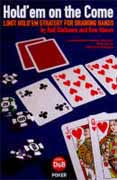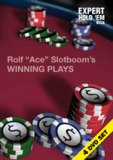
Hold'em on the Come

Rolf Slotboom's Winning Plays
Remarkable New Poker Books Reviewed
 Howard Schwartz, the "librarian for gamblers," is the marketing director for Gambler's Book Club in Las Vegas, a position he has held since 1979. Author of hundreds of articles on gambling, his weekly book reviews appear in numerous publications throughout the gaming industry. Howard's website is www.gamblersbook.com in coming months, no doubt there'll be further interesting newcomers to the shelves. For now, however, let's look at two outstanding fresh titles from first-time authors. Sure to be a hit are Hold'em on the Come: Limit Hold 'em Strategy for Drawing Hands by Rolf Slotboom and Dew Mason (271 pages, paperbound, $19.95) and The Poker Face of Wall Street by Aaron Brown (350 pages, hardbound, $27.95).
Howard Schwartz, the "librarian for gamblers," is the marketing director for Gambler's Book Club in Las Vegas, a position he has held since 1979. Author of hundreds of articles on gambling, his weekly book reviews appear in numerous publications throughout the gaming industry. Howard's website is www.gamblersbook.com in coming months, no doubt there'll be further interesting newcomers to the shelves. For now, however, let's look at two outstanding fresh titles from first-time authors. Sure to be a hit are Hold'em on the Come: Limit Hold 'em Strategy for Drawing Hands by Rolf Slotboom and Dew Mason (271 pages, paperbound, $19.95) and The Poker Face of Wall Street by Aaron Brown (350 pages, hardbound, $27.95).Slotboom, a limit hold'em and pot-limit Omaha cash game specialist, is considered by his peers to be a respected strategist. He writes regularly for poker publications. Co-author Mason is a professional mid-limit hold'em player and mathematical expert. Their book focuses specifically on the proper way to play drawing hands after the flop, which is, the authors say "...where even decent to good players often fail miserably." The authors are aiming at the average player "who is trying to lift his game to a higher level."
This is not a book for beginners, and it assumed readers have a basic knowledge of poker theory. The book contains 10 major chapters, well-illustrated with sample hands to emphasize key points. It’s packed with "table action charts" to underscore, to emphasize and reinforce the advice about the logical play.
Chapter headings cover counting outs including pot odds; estimating the number and value of your outs; basic rules for counting outs and partial outs plus borderline decision-making. Key concepts examined include why draw odds are meaningless unless they measure the chance of winning and that flop odds change if you are committed to the hand. A key chapter underscores the importance of classifying your opponents (loose vs. tight; aggressive vs. passive for example); and the advantage of relative position.
This smoothly written and balanced presentation then moves to the chapter focusing on pot size, on the flop, on the turn, if the pot is raised and how to play marginal decisions.
Just what are good draws vs. exceptional draws and long-shot draws? The authors answer those questions and discuss bluffing on the river; when the board pairs and raising with middle pair.
Greg Raymer, world class player and World Series of Poker winner says this book is "...a great addition to poker literature." I wholeheartedly agree.
Aaron Brown, both avid, respected poker player/author and executive director at a prestigious investment bank, also holds a degree from Harvard in applied mathematics. In great part, the theme of his book is that economic life is gambling. This is agreement with another fine book authored by Nassim Taleb, Fooled by Randomness (The Hidden Role of Chance in Life and Markets).
Brown covers a wide variety of subjects, but it's evident he finds specific parallels with the way we invest our time and money in poker with the way people invest, often guess and risk their money on Wall Street and elsewhere. It's clear he loves the game, even offering one of the clearest and well-written little chapters ever on the history and evolution of the game.
He shows respect and quotes properly from some of the best book ever written on poker, mixing in personal experience at the tables with poker and game theory. It's like a well-prepared pot of soup from a master chef.
In part, he tells us why it's important to "make the other guy blink first" at the poker table just as you would in a tricky business situation -- and he's clearly a contrarian in many of his views or theories. "If I were going to play only one hand of poker in my life, I would play it to maximum expected value. I wouldn't bluff....I would use probability theory, not game theory, to choose my actions."
Many may disagree with that and too, when he says many of the pre-l990s poker champions "...won huge amounts of money, yet they are frequently broke. They're obviously very good at winning money at poker, but not so good at keeping it. There appear to be forces outside the table that are important to consider if you want to be consistently successful at poker."
Chapter headings include The Art of Uncalculated Risk; A Brief History of Risk Denial (including Hedging Bets and a vital explanation of how Hold 'em finally got legalized in California); The Games People Play (When Luck Has Nothing to Do With It; Bluffing Mathematics; beating Liar's Poker); and a remarkable six-page annotated bibliography which save any future researcher of the game of poker, countless hours. The 17-page index will help those who argue poker is a game of skill rather than chance find evidence to support the claim.
Packed with colorful stories about people, theories and risk, Brown's work is endorsed by financial experts Ed Thorp (Beat the Dealer, Beat the Market) and William Ziemba, alumni professor of financial modeling and stochastic optimization at the University of British Columbia in Vancouver.

